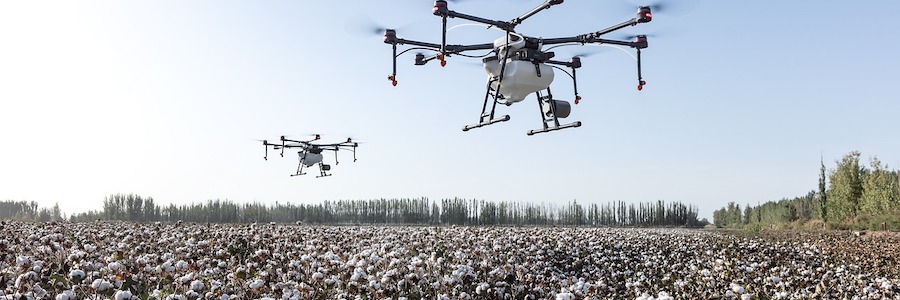A groundbreaking exemption for drone piloting from the Federal Aviation Administration (FAA) has further opened the door into the integration of drone applications on farms. This exemption has been given to a company called Hylio, Texas-based drone manufacturer at the forefront precision agriculture in the drone market.
The FAA exemption, will allow fleets of three drones weighing 55 pounds or more to fly together while only being required to have the same piloting team as one. This regulatory milestone has paved the way for the widespread adoption of drone-swarm agriculture, enabling farmers to leverage the benefits of aerial technology on a larger scale.
This is the first exemption of its kind. Hylio CEO Arthur Erickson says this exemption will allow drones to carry more “significant payloads”, and further increase efficiency on the farm. The standard approach has already been supplementing traditional agricultural practices in tasks such as seeding and spraying but this exemption is further game changing.
Erickson highlighted the transformative impact of this exemption on agricultural operations. By permitting the use of drones “swarms”,” the FAA has effectively leveled the playing field, making drone-swarm agriculture competitive with traditional farming equipment. This newfound efficiency translates into substantial cost savings for farmers, both in terms of upfront capital investment and ongoing operational expenses.
Traditionally, the operation of a single drone required a pilot and a spotter, limiting the speed and scope of coverage over large fields. However, with the FAA’s recent exemption, a two-person team can now operate up to three drones simultaneously, significantly increasing productivity and reducing labor requirements. This enhanced efficiency allows farmers to cover triple the area in the same amount of time, making drone-swarm agriculture nearly as fast as conventional tractor-based methods.
Andy Kreikemeier, a Nebraska farmer and early adopter of drone technology, underscored the practical benefits of the FAA exemption for his operation. With the ability to run multiple drones concurrently, Kreikemeier has witnessed a marked increase in coverage efficiency, accompanied by a reduction in personnel and labor costs. This newfound flexibility has empowered farmers like Kreikemeier to maximize their output while minimizing environmental impact.

In terms of cost, drones offer a compelling alternative to traditional agricultural machinery. While a conventional tractor can cost upwards of $300,000, or even $700,000. It is no secret the rising cost of machinery, and even after so many years, there are still sectors still recovering from pandemic shutdowns and other supply train issues.
Hylio’s drones are priced at around $50,000 each, making them a more affordable option for farmers of all sizes at times. Erickson emphasized that this cost-effective pricing model, coupled with the operational efficiencies afforded by drone-swarm technology, positions drones as a viable solution for modern farming operations. He further added that there are also no ongoing software subscription costs, which other drone manufactures have implemented.
Though it is doubtful we will see drone swarm technology replace tractors, it still represents a possible and significant supplemental piece of equipment on the farm.
Beyond their applications in agriculture, drones have demonstrated versatility in addressing a wide range of challenges across various industries. Erickson pointed out that drones have been utilized to reseed areas devastated by wildfires and to seed aquatic farms, showcasing their potential for environmental restoration and sustainable resource management.
Looking ahead, the sky’s the limit for drone technology in agriculture and beyond. With continued advancements in drone capabilities and regulatory support from agencies like the FAA, the adoption of drone-swarm technology is poised to accelerate, driving further innovation and efficiency in the agricultural sector.
The FAA exemption for drone-swarm agriculture represents a significant milestone in the evolution of modern farming practices and drone operating procedure. By harnessing the power of aerial technology, it seems farmers can achieve even better levels of efficiency, productivity, and cost-effectiveness as we move further into the future.







